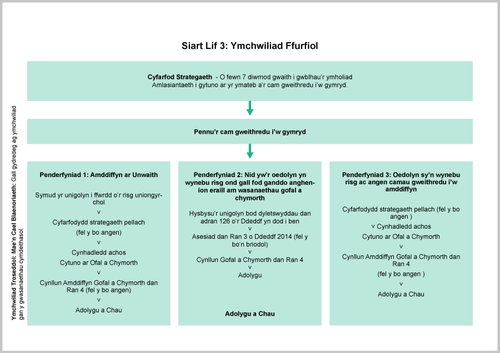Reviewing the adult safeguarding (adult protection) process
The purpose of the review is to ensure that the strategy group have completed the actions detailed in the plan and to decide whether a plan continues to be required. If it is required, they should consider whether any additional or different actions are necessary. It is important to note that reviews may not be required in all cases.
The care and support protection plan should be reviewed regularly by the strategy group to ensure the adult is safe from abuse and neglect and care and support needs are met.
Timescales for review should be person-centred reflecting individual circumstances and protection needs. At a minimum, reviews of care and support protection plans should take place at no more than 6-week intervals.
Decisions about ceasing the adult safeguarding process should be made by, or in agreement with the local authority . This will be pertinent where the lead co-ordinator role has been delegated to another agency i.e. health.
In cases where the safeguarding process ends (Determination 3) the adult at risk may have ongoing care and support needs. These needs should be reviewed by the care management team in line with Part 4 of the Social Services and Wellbeing Act (wales) 2014.

Flowchart 3: strategy meeting and what happens after a strategy meeting
Review the care and support protection plan
Whether at a strategy meeting, adult protection conference or specific review meeting, consideration should be given to the following questions:
- What evidence is there that the care and support protection plan is no longer required because the adult is safe from harm?
- Do they require a care and support plan under Part 4 of the Social Services and Well-being (Wales) Act 2014?
or
- What evidence is there that the care and support protection plan should continue and/or be revised to protect an adult at risk from abuse and neglect.
- Have the circumstances of the adult at risk changed and how is that affecting their risk of abuse and neglect?
- Can the desired outcomes by achieved by revising the existing plan? If so what changes need to be made to the plan?
- What timescales should be set for implementation and review?
- Do we need to change the practitioners working on the plan and/or revise their roles and responsibilities?
- Are the change of circumstances and newly identified risks such that they cannot be addressed by the existing plan? If so, are new section 126 enquiries necessary to decide what action is required to keep the adult at risk safe?
Pointers for Practice: An Agenda for Review Meetings
Participation by the adult at risk in the review of their care and support protection plan
The adult at risk should be supported to take a lead in ascertaining whether the plan is being effective. They may wish to bring an advocate. If the adult at risk has been assessed as lacking mental capacity to make decisions about the care and support protection plan then the person identified as acting in their best interests should be invited.
It is essential that evidence about quality changes to their lived experience, in terms of feeling and being safe, are central to decision-making. The adult at risk should be provided with information about options that could be included in the plan that could make it more person-centred.